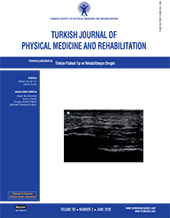Is kinesiophobia associated with lymphedema, upper extremity function, and psychological morbidity in breast cancer survivors?
2 Department of Psychiatry, Ankara Yıldırım Beyazıt University, Ankara, Turkey DOI : 10.5606/tftrd.2019.2585 Objectives: This study aims to the effects of kinesiophobia on lymphedema, upper extremity function, depression/anxiety, and quality of life in breast cancer survivors.
Patients and methods: Between January 2015 and January 2016, a total of 81 breast cancer survivors (mean age 54.1±10.8 years; range 44 to 70 years) were included. Lymphedema was evaluated based on the circumference measurements. The Tampa Scale for Kinesiophobia (TSK), the Quick Disabilities of Arm, Shoulder, and Hand (Q-DASH) Questionnaire, the Hospital Anxiety and Depression Scale (HADS), and the Short Form-36 (SF-36) were applied to all patients.
Results: We found a significantly higher rate of lymphedema in the patients with kinesiophobia. Kinesiophobic patients had also significantly higher mean scores of TSK, Q-DASH, HADS-A, and HADS-D and lower mean scores of the SF-36 physical scores. Correlation analysis demonstrated that presence of lymphedema, Q-DASH, HADS-A, and HADS-D scores were significantly associated with the TSK scores.
Conclusion: Kinesiophobia increases the risk for lymphedema, depression/anxiety, and decreased upper extremity functioning in breast cancer survivors. Identifying kinesiophobia in breast cancer survivors, psychosocial providers may help to prevent undesirable effects of kinesiophobia.
Keywords : Breast cancer; kinesiophobia; lymphedema; upper extremity functioning

















